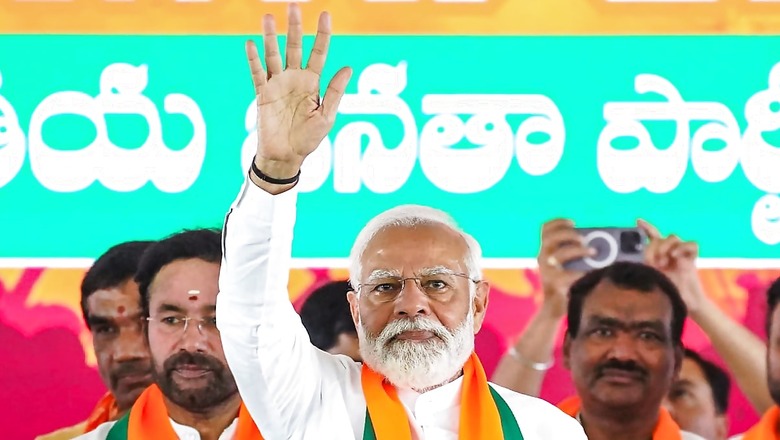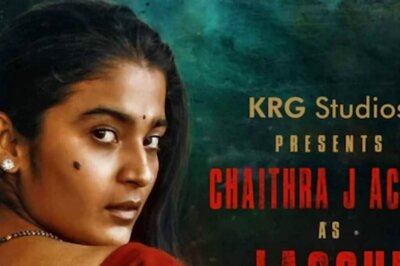
views
Lalu Yadav recently garnered attention for questioning Narendra Modi’s stance on political families despite Modi himself not having one. Many people criticised Yadav for trying to divert attention from more important matters. But most people in the country supported Narendra Modi. They pointed out that Modi came from a simple background and worked his way up to become the prime minister. They believe Modi’s success shows that he earned his position through hard work, and they trust him to lead the country well and for him, his country is his family. This support for the prime minister was evident on social media, where the nation showed its backing by using the hashtag #ModiKaParivar.
In addition to the discourse surrounding Lalu Yadav’s remarks, PM Narendra Modi previously addressed the issue in Parliament. He clarified that he is not opposed to individuals from the same family entering politics based on merit. However, he emphasised his opposition to the dominance of one family within a political party, defining this as the essence of dynasty politics. Modi highlighted the importance of meritocracy and fair competition within parties, suggesting that a singular family’s perpetual control undermines democratic principles. This distinction provided further context to the ongoing debate, with many citizens resonating with Modi’s stance on breaking the trend of dynastic rule in Indian politics.
In the Indian political landscape, several parties are known for being governed by families, both at the national and regional levels, spanning from the northern to the southern regions of the country. At the national level, the Indian National Congress (INC) has been historically associated with the Nehru-Gandhi family, with prominent leaders such as Jawaharlal Nehru, Indira Gandhi, Rajiv Gandhi, Sonia Gandhi, and Rahul Gandhi all belonging to this political dynasty.
Moving to regional parties, in the northern region, the Samajwadi Party (SP) in Uttar Pradesh has been led by the Yadav family, with Mulayam Singh Yadav and his son Akhilesh Yadav playing prominent roles. Similarly, in Bihar, the Rashtriya Janata Dal (RJD) has been dominated by the Yadav family, with Lalu Prasad Yadav and his children Tejashwi Yadav and Misa Bharti being key figures.
In the western region, the Shiv Sena in Maharashtra has seen the rise of leaders from the Thackeray family, including Bal Thackeray and his son Uddhav Thackeray.
Moving to the southern region, the Dravida Munnetra Kazhagam (DMK) in Tamil Nadu has been led by the Karunanidhi family, with M. Karunanidhi and his son MK Stalin being prominent figures. Similarly, the All India Anna Dravida Munnetra Kazhagam (AIADMK) in Tamil Nadu has been influenced by the leadership of the Jayalalithaa and Sasikala families.
In Telangana and Andhra Pradesh, the Telugu Desam Party (TDP) has been associated with the Nandamuri and Nara families, with leaders such as NT Rama Rao, Chandrababu Naidu, and Nara Lokesh being key figures.
These examples showcase the prevalence of family-dominated politics across various regions and parties in India’s diverse political landscape.
In contrast to the prevalent dynastic patterns in various regional and national parties, the Bharatiya Janata Party (BJP) stands out for its distinctive organisational approach. The BJP emphasises a meritocratic system where opportunities are extended to individuals based on their capabilities and dedication to the party’s principles.
Unlike parties where leadership positions are often predetermined by familial ties, the BJP fosters an environment of unpredictability and inclusivity. Within the BJP, the selection of party leaders, including the president, is not bound by familial relationships, providing a stark departure from the dynastic norm seen in other political entities.
The BJP’s organisational structure promotes a culture where aspiring leaders rise through the ranks based on their merit, dedication, and grassroots connect rather than familial lineage. This approach aligns with the broader philosophy of the party, emphasising individual capabilities and contributions over hereditary entitlements.
The contrast in organisational ethos raises important questions about the dynamics of political leadership in India. As the BJP continues to challenge the conventional narrative of dynastic politics, it prompts a re-evaluation of the criteria for leadership roles within political parties. The emphasis on providing opportunities to a diverse range of individuals within the BJP contributes to a more dynamic and unpredictable political landscape, where leadership is earned rather than inherited. As discussions continue, the nation awaits further developments on how these perspectives will shape the future political landscape.
Adv. Ashutosh Mishra is Managing Partner, Nyaayam Associates. Views expressed in the above piece are personal and solely that of the author. They do not necessarily reflect News18’s views.



















Comments
0 comment